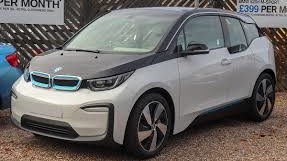Exploring the Future: A Journey with the BMW i3


First Impressions
Interior and Comfort
Stepping inside, the i3's cabin is a revelation. The use of sustainable materials, such as recycled plastics and natural fibers, is both commendable and visually appealing. The seating position is high, offering excellent visibility, and the minimalist dashboard is dominated by two large screens that provide all the necessary information at a glance. The rear-hinged 'suicide' doors make for easy access to the rear seats, although space back there is somewhat limited.
Driving Dynamics
Now, let's get to the part that really matters to me: the driving experience. The BMW i3 is powered by an electric motor that delivers 168 horsepower and 184 lb-ft of torque. While these numbers might not seem impressive compared to high-performance sports cars, the instant torque delivery of the electric motor makes the i3 feel surprisingly quick off the line. The 0-60 mph sprint is dispatched in just over 7 seconds, which is more than adequate for city driving.
The i3's handling is another pleasant surprise. The car's low center of gravity, thanks to the floor-mounted battery pack, and its rear-wheel-drive layout contribute to a nimble and engaging driving experience. The steering is precise, and the regenerative braking system is well-calibrated, allowing for smooth and intuitive one-pedal driving. While the i3 is not a track weapon, it offers a level of agility and responsiveness that is rare in the EV segment.
Range and Charging
One of the most critical aspects of any EV is its range, and the BMW i3 does not disappoint. With a full charge, the i3 offers an EPA-estimated range of 153 miles. While this may not be sufficient for long road trips, it is more than adequate for daily commuting and short weekend getaways. The i3 also supports DC fast charging, which can replenish 80% of the battery in about 40 minutes, making it convenient for quick top-ups during longer journeys.
On the Road: A Scenic Adventure
For this trip, I decided to take the BMW i3 on a scenic drive through the picturesque countryside. The route included a mix of urban streets, winding country roads, and open highways, providing a comprehensive test of the i3's capabilities. The car's compact size and excellent maneuverability made navigating the narrow, twisty roads a joy. The quietness of the electric powertrain allowed me to fully appreciate the serene beauty of the landscape, without the intrusive noise of a traditional internal combustion engine.
During the journey, I also had the opportunity to test the i3's advanced driver assistance systems. The adaptive cruise control and lane-keeping assist worked seamlessly, reducing the stress of highway driving and allowing me to relax and enjoy the ride. The car's infotainment system, with its intuitive interface and crisp graphics, kept me entertained and informed throughout the trip.
Conclusion
After spending a few days with the BMW i3, I can confidently say that this car is a game-changer. It combines innovative design, sustainable materials, and a genuinely enjoyable driving experience in a compact, eco-friendly package. While it may not offer the raw performance of a GT3 race car, the i3's agility, instant torque, and advanced technology make it a compelling choice for anyone looking to embrace the future of mobility.
Whether you're an urban dweller seeking a practical and stylish city car, or a car enthusiast looking for a unique and engaging driving experience, the BMW i3 is worth considering. It may not be perfect, but it represents a significant step forward in the evolution of the automobile.
Specifications
| Specification | Value |
|---|---|
| Engine | Electric Motor |
| Horsepower | 168 |
| Torque (lb-ft) | 184 |
| 0-60 mph | 7.2 seconds |
| Top speed | 93 mph |
| Battery capacity | 42.2 kWh |
| Range | 153 miles |
| Charging time (DC fast charge) | 80% in 40 minutes |
| Drive type | Rear-Wheel Drive |
| Seating capacity | 4 |
| Cargo capacity | 15.1 cubic feet |